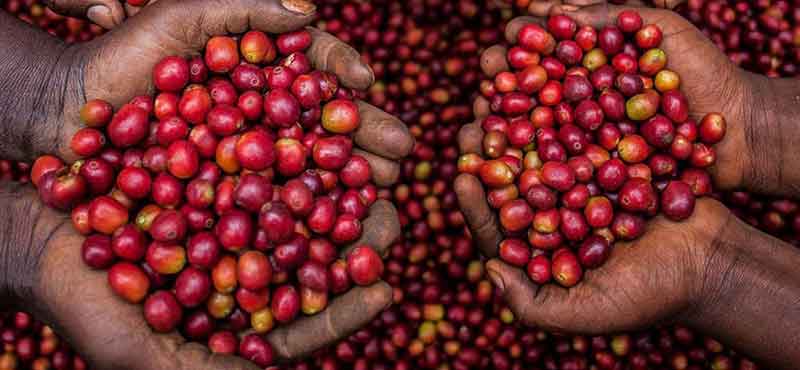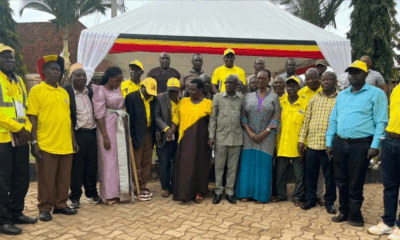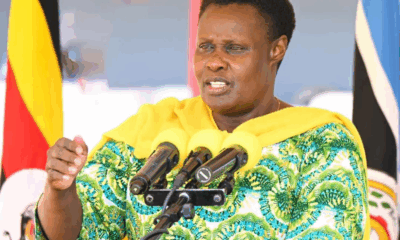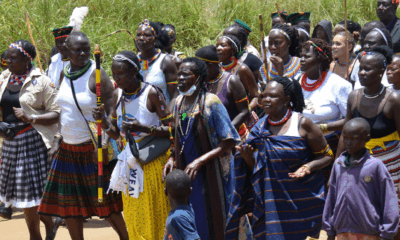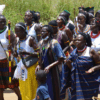News
Better coffee prices bring joy and fear to farmers
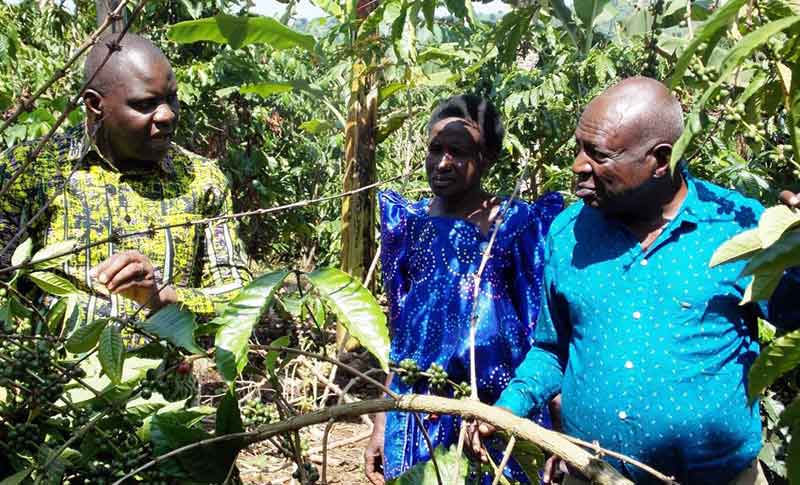
Coffee farmer Michael Ssali from Lwengo is hopeful about the future
Harriet Nambassa, a coffee buyer in Miseebe, Bulera sub County Mityana district speaks with awe and joy these days whenever she talks about the coffee business.
“We have never seen this in our whole life – selling a kilo of Kase at 6500 shillings! God has truly remembered us,” Nambassa delightfully remarked during a conversation she had with this reporter last week.
John Kizza, another resident of the village and also coffee farmer made a quick rejoinder. “Era kati tunywa beer, ssi waragi. Translated as, (Now we drink beer not the cheep and crude intoxicants that are usually parked in small disposable bottles).”
Several miles across in Lwengo, one of the districts in Greater Masaka region of South Western Uganda – arguably the biggest coffee-growing region of Uganda, similar sentiments of excitement have gripped farmers there.
Michael Ssali a prominent coffee farmer says buyers are offering up to UGX6500 for a kilo of Kase, the processed type of their Robusta coffee.
“We are extremely happy with the current prices of coffee. It’s extremely gratifying to be able to earn some useful money from our toil,” Ssali said.
The excitement among coffee farmers in Uganda is due to a sharp rise in coffee prices at the international market due to limited supplies of the commodity.
In many parts of central Uganda, a major Robusta coffee-growing region, coffee prices have shot up by more than 80 percent.
The Price of a kilo of Kibooko – the unprocessed dry coffee beans, has hit UGX3,300 (Slightly below one US dollar) while the price of the processed Kase has touched UGX6,500.
The sudden burst in prices is due to supply constraints from the world’s biggest coffee producer like Brazil, Vietnam, Columbia and Nicaragua, according to reports from the International Coffee Organization (ICO) as well as from other major business news outlets.
Reports indicate that Brazil’s coffee production has been negativity affected by double whammy of a severe drought and extreme coldness also called frost that killed many of their coffee trees.
Brazilian authorities are projecting lower yields for the next 12 years when new plantations are expected to be raised to bring production back to last year’s levels.
But the ICO points out that the current prices are but just a market correction since prices have been buttressed for many years.
For Ssali, and indeed many other farmers of the crop in Uganda, Brazil’s woes are a huge blessing in disguise that they would wish to continue.
By the time this reporter rang him up for a comment on this story, Ssali was busy tending to his garden.
“I tell you, these days I spend most of my time in the garden, cleaning it, pruning and weeding. I move with a slasher to clear any grass that I come across. I have applied fertilizer and it looks luxuriant.”
Ssali adds that the runaway prices of coffee have motivated many people to rehabilitate their gardens with the hope of cashing in on the fortune.
Ssali says that interest towards coffee farming had generally improved among farmers even before the prices rose, but the latest price boom has added vigor and energy so much so that even those with a few scattered trees are tending to them.
“I am praying that if prices continue like this, I will be a rich man next year because I am expecting a good harvest next season because I generally do good husbandry and I use fertilizers,” Ssali says.
The higher prices are expected to greatly boost the country’s plan of increasing the country’s coffee revenue and volume projections.
With distribution of free coffee seedlings over the past couple of years, the government had aimed at increasing coffee exports from the current 6 million bags to 20 million bags by 2025.
Thieves now target the farms and the farmers
The surge in prices has however attracted thieves.
Ssali says in his area, thieves have invaded gardens and harvested the beans at night.
They go to people’s gardens with torches and harvest the coffee at night. Use of police dogs to track them has so far proved futile because they use Boda Bodas that confuse the dogs.”
Back in Mityana, farmers are also thinking of reinforcing security. In Miseebe, where Nambassa works, youthful members of the community have intensified their night watch activities to be able to stop any thieves.
“Our group was formed to primarily counter cattle thieves. But in view of the increase in thefts of coffee, we’re expanding our scope towards coffee.” said Sserunjogi John, a resident of Nambute -Miseebe village.
Coffee price boom brings joy and anxiety to farmers
By Henry Lutaaya
Harriet Nambassa, a coffee buyer in Miseebe, Bulera sub County Mityana district speaks with awe and joy these days whenever she talks about the coffee business.
“We have never seen this in our whole life – selling a kilo of Kase at 6500 shillings! God has truly remembered us,” Nambassa delightfully remarked during a conversation she had with this reporter last week.
John Kizza, another resident of the village and also coffee farmer made a quick rejoinder. “Era kati tunywa beer, ssi waragi. Translated as, (Now we drink beer not the cheep and crude intoxicants that are usually parked in small disposable bottles).”
Several miles across in Lwengo, one of the districts in Greater Masaka region of South Western Uganda – arguably the biggest coffee-growing region of Uganda, similar sentiments of excitement have gripped farmers there.
Michael Ssali a prominent coffee farmer says buyers are offering up to UGX6500 for a kilo of Kase, the processed type of their Robusta coffee.
“We are extremely happy with the current prices of coffee. It’s extremely gratifying to be able to earn some useful money from our toil,” Ssali said.
The excitement among coffee farmers in Uganda is due to a sharp rise in coffee prices at the international market due to limited supplies of the commodity.
In many parts of central Uganda, a major Robusta coffee-growing region, coffee prices have shot up by more than 80 percent.
The Price of a kilo of Kibooko – the unprocessed dry coffee beans, has hit UGX3,300 (Slightly below one US dollar) while the price of the processed Kase has touched UGX6,500.
The sudden burst in prices is due to supply constraints from the world’s biggest coffee producer like Brazil, Vietnam, Columbia and Nicaragua, according to reports from the International Coffee Organization (ICO) as well as from other major business news outlets.
Reports indicate that Brazil’s coffee production has been negativity affected by double whammy of a severe drought and extreme coldness also called frost that killed many of their coffee trees.
Brazilian authorities are projecting lower yields for the next 12 years when new plantations are expected to be raised to bring production back to last year’s levels.
But the ICO points out that the current prices are but just a market correction since prices have been buttressed for many years.
For Ssali, and indeed many other farmers of the crop in Uganda, Brazil’s woes are a huge blessing in disguise that they would wish to continue.
By the time this reporter rang him up for a comment on this story, Ssali was busy tending to his garden.
“I tell you, these days I spend most of my time in the garden, cleaning it, pruning and weeding. I move with a slasher to clear any grass that I come across. I have applied fertilizer and it looks luxuriant.”
Ssali adds that the runaway prices of coffee have motivated many people to rehabilitate their gardens with the hope of cashing in on the fortune.
Ssali says that interest towards coffee farming had generally improved among farmers even before the prices rose, but the latest price boom has added vigor and energy so much so that even those with a few scattered trees are tending to them.
“I am praying that if prices continue like this, I will be a rich man next year because I am expecting a good harvest next season because I generally do good husbandry and I use fertilizers,” Ssali says.
The higher prices are expected to greatly boost the country’s plan of increasing the country’s coffee revenue and volume projections.
With distribution of free coffee seedlings over the past couple of years, the government had aimed at increasing coffee exports from the current 6 million bags to 20 million bags by 2025.
Thieves now target the farms and the farmers
The surge in prices has however attracted thieves.
Ssali says in his area, thieves have invaded gardens and harvested the beans at night.
They go to people’s gardens with torches and harvest the coffee at night. Use of police dogs to track them has so far proved futile because they use Boda Bodas that confuse the dogs.”
Back in Mityana, farmers are also thinking of reinforcing security. In Miseebe, where Nambassa works, youthful members of the community have intensified their night watch activities to be able to stop any thieves.
“Our group was formed to primarily counter cattle thieves. But in view of the increase in thefts of coffee, we’re expanding our scope towards coffee.” said Sserunjogi John, a resident of Nambute -Miseebe villa.
Comments



